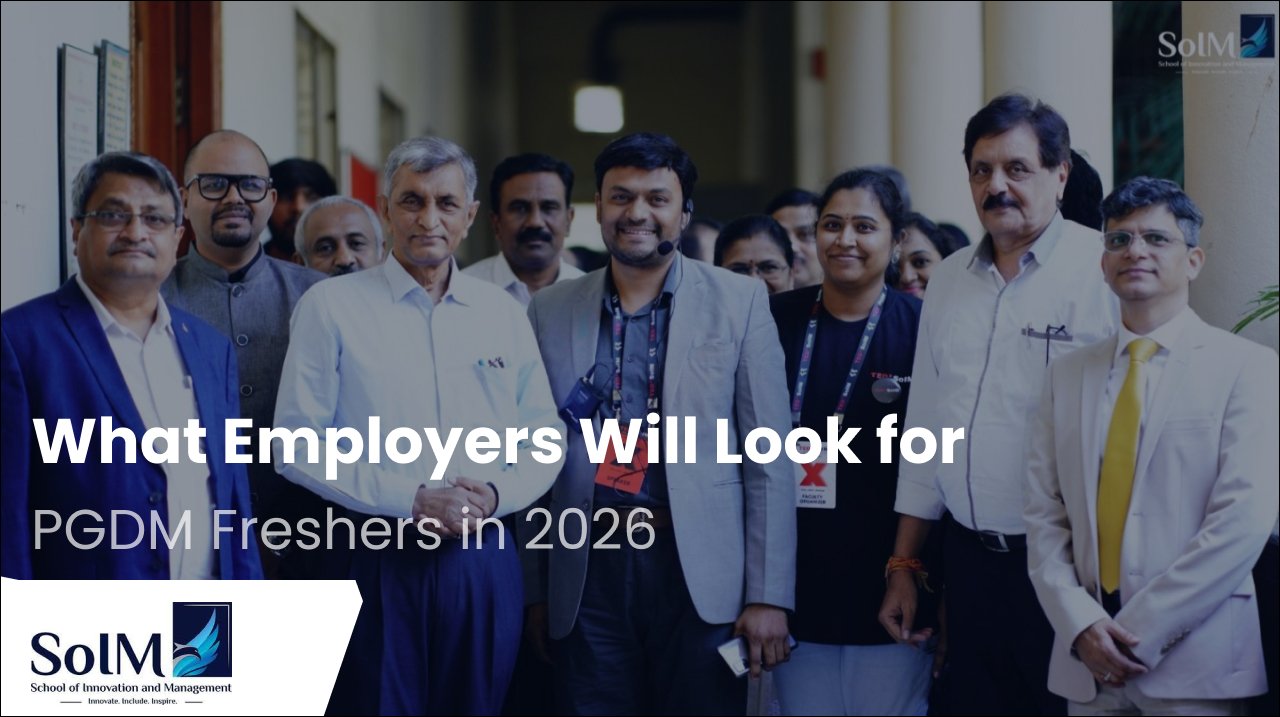In the dynamic and ever-evolving global economy, the financial services sector plays a pivotal role in shaping the future. This sector encompasses a wide array of financial activities, ranging from banking and insurance to asset management, investment banking, and financial technology (fintech). As the world becomes increasingly interconnected and complex, the demand for professionals well-versed in finance is on the rise. For those seeking a promising and lucrative career, a Post Graduate Diploma in Management (PGDM) in the Financial Services Sector can unlock a world of opportunities.
This blog will take you on a journey through the world of PGDM in Financial Services, highlighting the various career prospects that await you in this exciting field. Whether you’re a recent graduate, a mid-career professional looking to switch industries, or simply curious about the potential of this sector, read on to discover the possibilities.

The Growing Significance of Financial Services
The financial services sector is the backbone of any economy. It facilitates the flow of money, supports businesses in their growth, and enables individuals to manage their finances effectively. This sector’s significance is further magnified by the increasing complexity of global financial markets and the rising need for financial products and services.
One of the driving forces behind the growth of the financial services sector is the rapid evolution of technology. With the advent of fintech companies, the traditional financial landscape is being reshaped. This, in turn, opens up new career opportunities for individuals with a strong foundation in financial services and a knack for innovation.
PGDM in Financial Services: A Gateway to Success
A PGDM career opportunities in Financial Services equips students with the knowledge and skills required to navigate this ever-evolving industry. These programs are designed to provide a comprehensive understanding of financial markets, instruments, and strategies. Whether you’re interested in investment banking, risk management, or wealth management, a PGDM in Financial Services can prepare you for a range of roles in the sector.
Here are some of the key areas you’ll explore in a PGDM program in Financial Services:
Financial Markets: Understanding how financial markets work is fundamental in this field. You’ll delve into topics like stock markets, bond markets, and derivatives, learning how they function and influence the broader economy.
Risk Management: The financial services industry is inherently exposed to various risks, such as market risk, credit risk, and operational risk. You’ll gain a deep understanding of risk management techniques and how to mitigate these risks.
Investment Analysis: If you’re interested in making informed investment decisions, a PGDM program will teach you how to analyze various investment options, assess their potential returns and risks, and create diversified portfolios.
Financial Regulation: As the sector is tightly regulated to ensure market stability and protect investors, you’ll learn about the legal and regulatory frameworks governing financial institutions and their operations.
In the dynamic and ever-evolving global economy, the financial services sector plays a pivotal role in shaping the future. This sector encompasses a wide array of financial activities, ranging from banking and insurance to asset management, investment banking, and financial technology (fintech). As the world becomes increasingly interconnected and complex, the demand for professionals well-versed in finance is on the rise. For those seeking a promising and lucrative career, a Post Graduate Diploma in Management (PGDM) in the Financial Services Sector can unlock a world of opportunities.
This blog will take you on a journey through the world of PGDM in Financial Services, highlighting the various career prospects that await you in this exciting field. Whether you’re a recent graduate, a mid-career professional looking to switch industries, or simply curious about the potential of this sector, read on to discover the possibilities.
The Growing Significance of Financial Services
The financial services sector is the backbone of any economy. It facilitates the flow of money, supports businesses in their growth, and enables individuals to manage their finances effectively. This sector’s significance is further magnified by the increasing complexity of global financial markets and the rising need for financial products and services.
One of the driving forces behind the growth of the financial services sector is the rapid evolution of technology. With the advent of fintech companies, the traditional financial landscape is being reshaped. This, in turn, opens up new career opportunities for individuals with a strong foundation in financial services and a knack for innovation.
PGDM in Financial Services: A Gateway to Success
A PGDM career opportunities in Financial Services equips students with the knowledge and skills required to navigate this ever-evolving industry. These programs are designed to provide a comprehensive understanding of financial markets, instruments, and strategies. Whether you’re interested in investment banking, risk management, or wealth management, a PGDM in Financial Services can prepare you for a range of roles in the sector.
Here are some of the key areas you’ll explore in a PGDM program in Financial Services:
Financial Markets: Understanding how financial markets work is fundamental in this field. You’ll delve into topics like stock markets, bond markets, and derivatives, learning how they function and influence the broader economy.
Risk Management: The financial services industry is inherently exposed to various risks, such as market risk, credit risk, and operational risk. You’ll gain a deep understanding of risk management techniques and how to mitigate these risks.
Investment Analysis: If you’re interested in making informed investment decisions, a PGDM program will teach you how to analyze various investment options, assess their potential returns and risks, and create diversified portfolios.
Financial Regulation: As the sector is tightly regulated to ensure market stability and protect investors, you’ll learn about the legal and regulatory frameworks governing financial institutions and their operations.
Financial Technology (Fintech): Given the growing role of technology in the financial sector, fintech is a critical component of many PGDM programs. You’ll explore how technology is disrupting traditional finance and creating new opportunities.
Career Opportunities in Financial Services
Now that you have a sense of what a PGDM in Financial Services entails, let’s explore the numerous career opportunities it can unlock for you:
Investment Banking: Investment bankers play a pivotal role in helping companies raise capital, merge with or acquire other businesses, and navigate complex financial transactions. They are often involved in strategic advisory roles and are well-compensated for their expertise.
Wealth Management: Wealth managers help high-net-worth individuals and families manage their assets and investments. This role involves creating tailored financial plans, offering investment advice, and ensuring clients’ financial goals are met.
Asset Management: Asset managers oversee and grow investment portfolios on behalf of individuals, institutions, or mutual funds. This involves researching and selecting investment options to maximize returns.
Corporate Finance: Finance professionals working in corporate finance are responsible for managing their company’s financial decisions, such as budgeting, financial planning, and ensuring sufficient capital is available for operations and growth.
Risk Management: Risk managers identify, assess, and mitigate various risks associated with financial activities. They play a critical role in maintaining the financial stability of organizations.
Insurance: The insurance industry offers diverse career opportunities, including roles in underwriting, claims assessment, actuarial science, and sales. These positions are crucial for protecting individuals and businesses from unforeseen financial losses.
Fintech: The financial technology sector is booming, and it offers exciting prospects for innovative professionals. Careers in fintech can include roles in startups, established tech companies, or even launching your own fintech venture.
Financial Regulation and Compliance: Regulators and compliance officers ensure that financial institutions adhere to the rules and regulations governing their operations. They play a crucial role in maintaining market integrity and protecting consumers.
Real Estate Finance: Real estate finance professionals specialize in financing and investment in the real estate market. This field offers diverse career opportunities in property management, development, and investment.
Consulting: Financial consulting firms provide services to various clients, including businesses, government agencies, and nonprofits. These consultants offer advice on financial strategies, risk management, and investment decisions.
Teaching and Research: For those inclined toward academia and research, a PGDM in Financial Services can open doors to careers in teaching at business schools or conducting research in financial institutions.
The Advantages of a PGDM in Financial Services
Pursuing a PGDM career opportunities in Financial Services comes with several advantages that make it a valuable investment in your future:
High Earning Potential: Many roles in the financial services sector offer competitive salaries and bonuses, making it a financially rewarding career choice.
Global Opportunities: Finance is a global industry, and many positions offer opportunities to work in international markets, gaining exposure to different financial systems and cultures.
Continuous Learning: The finance industry is constantly evolving, and a PGDM equips you with the skills to adapt to these changes and stay at the forefront of the field.
Networking: PGDM programs often include networking events, alumni connections, and industry partnerships that can help you build a strong professional network.
Diverse Career Paths: The financial services sector is incredibly diverse, allowing you to explore various career paths and specialize in areas that align with your interests and strengths.
Job Security: Finance professionals are always in demand. Even during economic downturns, the sector remains relatively stable, providing job security.
Prestige and Recognition: Careers in finance are often associated with prestige and respect, and many professionals are recognized for their contributions to the industry.
Challenges and Considerations
While a career in the financial services sector can be incredibly rewarding, it’s essential to be aware of the challenges and considerations:
High Competition: The finance industry is competitive, and securing top roles often requires a high level of education, skills, and experience.
Long Hours: Some roles in finance, particularly in investment banking and asset management, can involve long working hours and high-pressure situations.
Regulatory Changes: Financial regulations are constantly evolving, and professionals need to stay up-to-date with changes that may impact their roles.
Ethical Considerations: Some aspects of finance, such as risk management and investment, involve ethical dilemmas that professionals must navigate.
Continuous Learning: To stay competitive in this field, you’ll need to commit to lifelong learning and professional development.
How to Pursue a PGDM in Financial Services
If you’re considering a career in the financial services sector and want to pursue a PGDM program, here’s a basic roadmap to get you started:
Research Programs: Start by researching PGDM programs in Financial Services offered by reputable business schools. Look for accredited institutions with a strong finance curriculum.
Admission Requirements: Check the admission requirements for each program, which may include standardized tests like the GMAT or GRE, undergraduate transcripts, letters of recommendation, and a personal statement.
Financial Planning: Assess the cost of the program and explore financing options, including scholarships, grants, and student loans.
Application Process: Prepare a compelling application that highlights your qualifications, experiences, and motivations for pursuing a PGDM in Financial Services.
Networking: Connect with alumni and current students of the program to gain insights into the curriculum, faculty, and career opportunities.
Prepare for Interviews: If you receive interview invitations, prepare for them by researching the program, reviewing your application, and practicing common interview questions.
Select Your Program: Once you’ve been accepted to multiple programs, carefully evaluate your options and select the one that best aligns with your career goals and values.
Excel in Your Studies: Once enrolled in the program, give it your best effort. Building a strong academic foundation is crucial for your future career success.
Internships and Networking: While pursuing your PGDM, consider internships and participate in networking events to build valuable connections and gain practical experience.
Graduate and Launch Your Career: Upon completion of your program, utilize your education and network to secure the job that aligns with your career aspirations.
Conclusion
A PGDM career opportunities in Financial Services can be your gateway to a successful and fulfilling career in the finance industry. This dynamic sector offers a wide array of career opportunities, excellent earning potential, and the chance to make a meaningful impact on businesses and individuals. While it comes with its share of challenges, the rewards can be substantial. So, if you’re intrigued by the world of finance and aspire to unveil a bright future, consider a PGDM in Financial Services as your path to success. The world of finance is waiting for you to unlock its endless possibilities.



